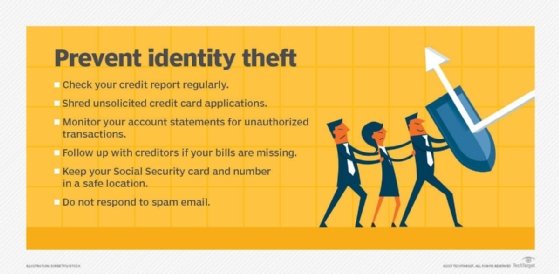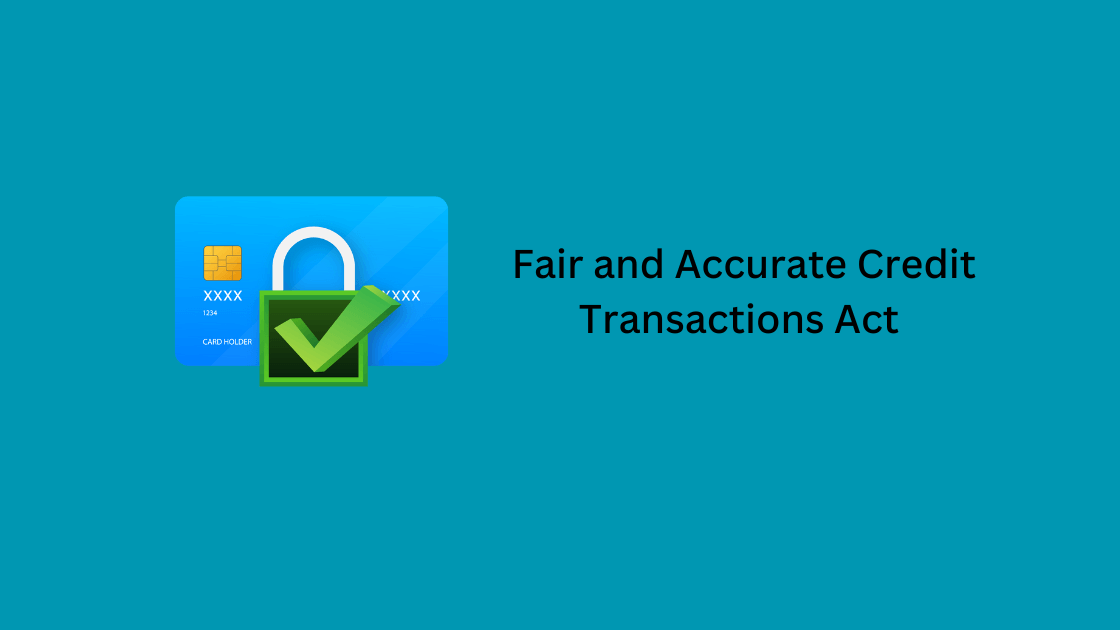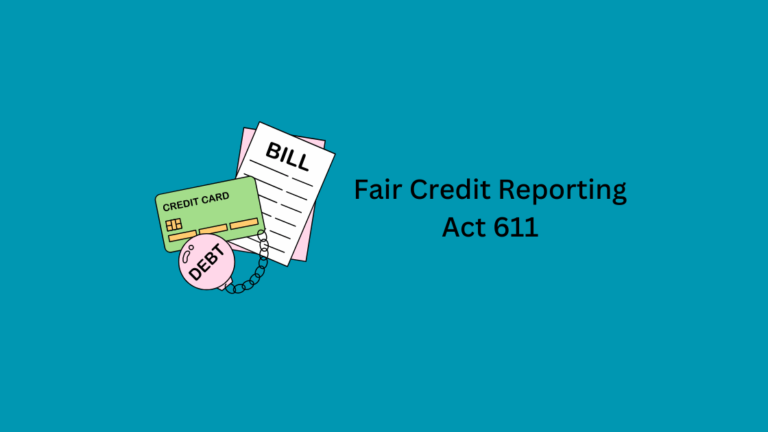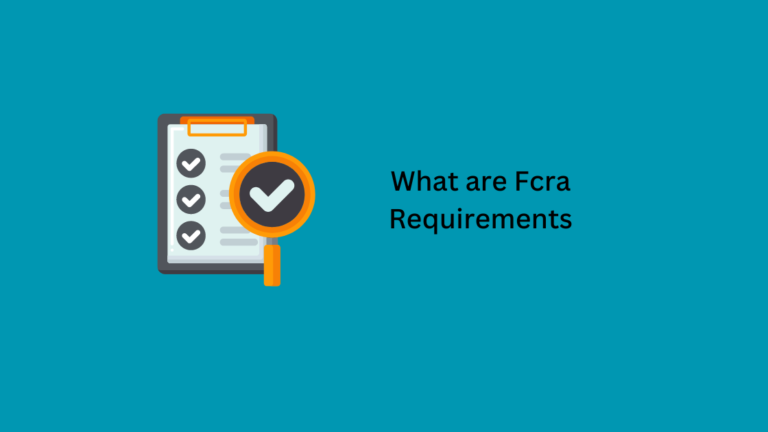Fair And Accurate Credit Transactions Act: Protect Your ID
The Fair and Accurate Credit Transactions Act (FACTA) aims to protect consumers from identity theft and improve credit accuracy. Enacted in 2003, it amends the Fair Credit Reporting Act.
FACTA plays a crucial role in safeguarding consumer information and enhancing credit report accuracy. It mandates free annual credit reports from major credit bureaus, helping individuals monitor their financial health. The act also establishes guidelines for secure disposal of sensitive data, reducing identity theft risks.
Businesses must adhere to these regulations to ensure consumer data protection. FACTA’s provisions empower consumers to take control of their credit information, fostering a more transparent and secure financial environment. Understanding FACTA’s impact is essential for consumers and businesses to maintain credit integrity and security.

Credit: www.shrednations.com
Introduction To FACTA
The Fair and Accurate Credit Transactions Act (FACTA) is a significant piece of legislation in the United States. It was enacted to help consumers protect their credit information and ensure its accuracy. FACTA plays a crucial role in the financial lives of many Americans.
Purpose And Importance
FACTA aims to help consumers safeguard their credit data. It provides tools to detect and prevent identity theft. The Act ensures the accuracy and privacy of consumer information. It also allows consumers to access their credit reports for free once a year. This helps them spot errors and take corrective action quickly.
Historical Context
FACTA was signed into law by President George W. Bush on December 4, 2003. It amended the Fair Credit Reporting Act (FCRA) of 1970. FACTA was a response to the growing issue of identity theft and inaccuracies in credit reports.
The Act introduced new provisions for better consumer protection. It addressed concerns about credit report errors and misuse of consumer information. FACTA has since become a vital tool in the fight against identity theft.
Key Provisions Of Facta
The Fair And Accurate Credit Transactions Act (FACTA) is crucial for protecting consumers’ financial information. FACTA aims to improve the accuracy and privacy of consumer credit information. Below, we delve into the key provisions of FACTA that empower consumers.
Consumer Rights
FACTA gives consumers several important rights. These rights help in safeguarding personal financial data.
- Right to Dispute: Consumers can dispute incorrect information on their credit reports.
- Fraud Alerts: Consumers can place fraud alerts on their credit files.
- Credit Score Disclosure: Lenders must provide consumers with their credit scores.
These rights ensure that consumers have control over their credit information.
Credit Report Access
FACTA makes credit reports more accessible to consumers. It includes the following provisions:
- Free Annual Credit Report: Consumers can get a free credit report every year from each major credit bureau.
- Online Access: Consumers can access their credit reports online easily.
- Identity Theft Victims: Victims of identity theft can receive additional free credit reports.
These provisions help consumers monitor their credit and detect fraud early.
| Provision | Description |
|---|---|
| Right to Dispute | Consumers can dispute incorrect information on their credit reports. |
| Fraud Alerts | Consumers can place fraud alerts on their credit files. |
| Credit Score Disclosure | Lenders must provide consumers with their credit scores. |
| Free Annual Credit Report | Consumers can get a free credit report every year from each major credit bureau. |
| Online Access | Consumers can access their credit reports online easily. |
| Identity Theft Victims | Victims of identity theft can receive additional free credit reports. |
Identity Theft Prevention
The Fair and Accurate Credit Transactions Act (FACTA) aims to protect consumers. Identity theft prevention is a key part of this act. FACTA provides tools and guidelines to guard against identity theft. These measures help consumers detect and respond to suspicious activities.
Red Flags Rule
The Red Flags Rule sets guidelines for businesses. These guidelines help in identifying signs of identity theft. Businesses must spot red flags to detect and prevent theft. Red flags include unusual account activity or alerts from credit agencies.
| Red Flag Example | Description |
|---|---|
| Unusual Account Activity | Sudden changes in spending patterns. |
| Alerts from Credit Agencies | Warnings about suspicious activities. |
Fraud Alerts
Fraud alerts are another tool under FACTA. They warn creditors of possible identity theft. There are two types of fraud alerts: initial and extended.
- Initial Fraud Alert: Lasts for 90 days. Useful if you suspect identity theft.
- Extended Fraud Alert: Lasts for seven years. Ideal for confirmed identity theft cases.
Placing a fraud alert is simple. Contact any one of the three major credit bureaus: Equifax, Experian, or TransUnion. They will inform the other two bureaus.

Credit: www.techtarget.com
Credit Report Accuracy
The Fair and Accurate Credit Transactions Act (FACTA) aims to ensure credit report accuracy. It helps protect consumers from errors that can impact their credit scores. Keeping your credit report accurate is crucial for financial health.
Dispute Process
If you find an error on your credit report, you can dispute it. The dispute process is straightforward:
- Get a copy of your credit report.
- Identify any incorrect information.
- Write to the credit bureau explaining the error.
- Include any supporting documents.
The credit bureau must investigate within 30 days. They contact the information provider to verify the dispute. If the error is confirmed, it must be corrected.
Role Of Credit Bureaus
Credit bureaus play a key role in maintaining credit report accuracy. They collect and maintain consumer credit information. The major credit bureaus are:
- Equifax
- Experian
- TransUnion
These bureaus must ensure the information they report is accurate. They are required by FACTA to provide a free credit report once a year. You can request your report from each bureau to check for errors.
Credit bureaus must also remove outdated negative information. For example, most negative information must be removed after seven years.
| Credit Bureau | Free Report Frequency | Website |
|---|---|---|
| Equifax | Once a year | equifax.com |
| Experian | Once a year | experian.com |
| TransUnion | Once a year | transunion.com |
Ensuring your credit report is accurate can improve your financial well-being. Regularly check your credit report and dispute any errors. This will help you maintain a good credit score.
Medical Information Protection
The Fair and Accurate Credit Transactions Act (FACTA) includes a crucial section on Medical Information Protection. This section ensures that your medical data remains safe and confidential. Let’s dive deeper into how it works.
Handling Medical Data
FACTA has strict rules for handling medical data. Businesses must protect your medical information. They can’t share it without proper security measures.
- Medical data must be stored securely.
- Only authorized personnel can access it.
- Data breaches must be reported promptly.
Companies need to train their staff on data protection. This ensures your medical data remains safe from unauthorized access.
Consumer Consent
Under FACTA, consumer consent is essential. Companies need your permission to use your medical data. They must inform you how your data will be used.
- Explain the purpose of data use.
- Get your written consent.
- Allow you to withdraw consent anytime.
Consent ensures you have control over your medical information. You decide who can access your data and for what purpose.

Credit: creditrepairlawyersam.com
Impact On Businesses
The Fair And Accurate Credit Transactions Act (FACTA) aims to protect consumers. It also has a significant impact on businesses. This law mandates that businesses handle customer data responsibly. They must take steps to prevent identity theft and ensure data security.
Compliance Requirements
Businesses must follow specific rules to comply with FACTA. Here are some key requirements:
- Secure Disposal: Businesses must properly dispose of consumer information.
- Red Flags Rule: They must develop a program to identify warning signs of identity theft.
- Truncation of Credit Card Numbers: Receipts must not show full credit card numbers.
These steps help ensure that consumer information stays safe. They also minimize the risk of identity theft.
Penalties For Non-compliance
Failing to comply with FACTA can lead to severe penalties. Businesses may face fines and legal action. Here are some potential consequences:
| Violation | Penalty |
|---|---|
| Not properly disposing of information | Fines up to $1,000 per violation |
| Not following Red Flags Rule | Legal actions and fines |
| Showing full credit card numbers on receipts | Fines and potential lawsuits |
These penalties highlight the importance of compliance. Businesses must take FACTA requirements seriously.
Consumer Tips
The Fair and Accurate Credit Transactions Act (FACTA) provides consumers with tools to protect their credit information. Here are some practical tips for consumers to stay vigilant and safeguard their financial data.
Monitoring Credit Reports
Regularly check your credit reports to spot any discrepancies. FACTA allows you to get a free annual credit report from each of the three major credit bureaus.
- Visit AnnualCreditReport.com to request your reports.
- Review each report carefully for errors or unfamiliar accounts.
- Report any mistakes to the credit bureau immediately.
Safe Financial Practices
Adopting safe financial habits is crucial to protect your credit information.
- Use strong, unique passwords for all online accounts.
- Enable two-factor authentication where available.
- Shred documents containing personal information before disposal.
Remember, staying proactive can help you maintain a healthy credit profile. Keep these tips in mind to safeguard your financial future.
Future Of FACTA
The Fair And Accurate Credit Transactions Act (FACTA) has evolved. The future of FACTA looks promising. It aims to offer better protection and transparency. Let’s explore potential reforms and technological advances.
Potential Reforms
Potential reforms may change how FACTA operates. Lawmakers may introduce new rules. These rules might provide stronger consumer protections. Below are some expected reforms:
- Improved data security measures
- Stricter penalties for data breaches
- Enhanced credit report accuracy
Enhanced credit report accuracy can prevent errors. It ensures fair treatment for consumers. The goal is to create a safer financial environment.
Technological Advances
Technological advances will shape FACTA’s future. Technology can make credit reporting more accurate. It can also improve data security. Here are some key technologies:
| Technology | Impact |
|---|---|
| Blockchain | Ensures secure and transparent transactions |
| Artificial Intelligence (AI) | Detects and corrects errors in credit reports |
| Encryption | Protects sensitive consumer data |
Blockchain technology offers secure and transparent transactions. AI helps detect and correct errors in credit reports. Encryption protects sensitive consumer data.
Frequently Asked Questions
1. What Did The Fair And Accurate Credit Transactions Act Do?
The Fair and Accurate Credit Transactions Act (FACTA) protects consumers from identity theft. It gives them the right to access free annual credit reports, dispute inaccuracies, and place fraud alerts. FACTA also mandates the secure disposal of sensitive credit information by businesses.
2. What Are The Main Points Of The Fair Credit Reporting Act?
The Fair Credit Reporting Act ensures the accuracy, fairness, and privacy of consumer information. It allows consumers to access and correct their credit reports. It restricts who can view credit reports and mandates consumer consent for credit checks. It also requires credit bureaus to investigate and correct errors.
3. What Is The Primary Purpose Of The Fair And Accurate Credit Transactions Act To Protect Consumers From?
The primary purpose of the Fair and Accurate Credit Transactions Act is to protect consumers from identity theft and fraud. It ensures accurate credit reporting, improves consumer access to credit information, and enhances privacy. This law helps safeguard personal financial data.
4. What Is Covered Under The Fact Act?
The FACT Act covers credit report accuracy, consumer access to credit information, identity theft prevention, and medical information privacy.
Conclusion
Understanding the Fair and Accurate Credit Transactions Act is crucial. It protects consumers and promotes fair credit practices. Stay informed about your rights under this law. Regularly monitor your credit reports for accuracy. Empower yourself with the knowledge to maintain a healthy credit score and financial well-being.







